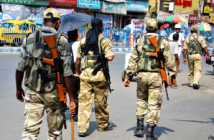New Delhi, Nov 14 (IANS) “Delhi: A Soliloquy”, by M. Mukundan, a “rambling, intimate epic” that “captures what it means to be a small person in a big capital” was on Saturday evening declared the winner of the Rs 25 lakh JCB Prize for Literature 2021, India’s richest literary award – the third time in four years and the second year in succession that a Malayalam translation has been so honoured.
“I dedicate this book to the poor people of Delhi and elsewhere,” a visibly moved Mukundan said at a hybrid ceremony here hosted by JCB Prize Literary Director Mita Kapur during which JCB Chairman Lord Bamford declared him the winner from London. The translators, Fathima E.V. and Nandakumar K, will share an additional Rs 10 lakh.
“I didn’t expect the award. It’s a great moment I will always cherish. I have won many awards in the past but this is incomparable,” Mukundan added.
“Delhi: A Soliloquy” (Westland) was selected from a shortlist of five books that included “Anti-Clock” by V.J. James, translated from the Malayalam by Ministhy S. (Penguin), “Place Animal Thing” by Daribha Lyndem (Zubaan), “The Plague Upon Us” by Shabir Ahmad Mir (Hachette), and “Gods and Ends” by Lindsay Pereira (Penguin).
Previous winners have been “Jasmine Days” by Benyamin, translated from the Malayalam by Shahnaz Habib, in the inaugural edition in 2018; “The Far Field” by Madhuri Vijay in 2019 and “Moustache:” by S. Hareesh, translated from the Malayalam by Jayasree Kalathil in 2020.
The book was selected by a panel of five judges: Sara Rai (Chair), Annapurna Garimella, Shahnaz Habib, Prem Panicker, and Amit Varma, all of whom were unanimous in their praise for?the book.
“Delhi: A Soliloquy” “speaks with grace and poise of the large lives of small people in a city with a broken soul. Clairvoyant in its human empathy, this extraordinary book is the distillation of a lifetime of experience,” Sara Rai said.
Mukundan is still nostalgic about a city where he lived for 40 long years before moving back to his hometown of Mahe and this prompted him to write the book.
“When I was in Delhi, I felt nostalgic about Mahe. Now it is the other way round – I’m nostalgic about Delhi. There’s no ideal place to live in, where you are that is your home,” Mukundan, four of whose works have been adapted for the big screen, had told IANS in an interview after being shortlisted for the award.
“In the early 60s when I arrived in Delhi, it was a quiet and safe place. There were villages within the city. After seeing a late night movie at the Race Course theatre, women and children would walk down to Lodhi Colony past midnight. No woman was harmed.
“In summer, we used to sleep on the charpoys spread out on the terraces of our houses without locking the main house door down below. It was a city anybody will dream of living. And then Delhi changed all of a sudden – a brutal, grotesque change.
“Factories and commercial establishments came up, attracting unemployed poor people from other states. Building mafias destroyed villages and fields and built ugly high-rise buildings. Poor people were pushed away to filthy slums where they led a wretched life of deprivation. Throwing away all values, a nouveau riche class prospered. Outwardly, Delhi is a beautiful city. But beneath lies hunger, filth and diseases,” Mukundan had elaborated.
–IANS
vm/shs




